With congress out of session this week, it is a good time to meet the members of the House Judiciary Committee’s Subcommittee on Courts, Intellectual Property, and the Internet, which—unlike the Senate IP Subcommittee—has not yet convened this term. While the House may be largely preoccupied with issues outside the IP realm thus far, other House committees and subcommittees have been actively debating a number of topics relevant to IP.
The 116th Congress brings both new and old faces to the Subcommittee with varying levels of IP knowledge and activity. Many of its members, such as Hakeem Jeffries and Zoe Lofgren, are well-versed in IP issues, starting with the full Judiciary Committee Chairman, Jerrold Nadler.
House Judiciary Committee Chairman
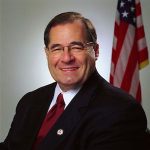
Congressman Jerrold Nadler (D-NY).
Jerrold Nadler (NY-10)
Representative Jerrold “Jerry” Nadler was born June 13, 1947, in Brooklyn, New York. The Chairman of the House Judiciary Committee, he served as Chairman or Ranking Member of its Subcommittee on the Constitution, Civil Rights, and Civil Liberties for 13 years and also served as the Ranking Member of the Subcommittee on Courts, Intellectual Property, and the Internet.
Nadler is a graduate of Columbia University and Fordham University School of Law. He began his political career in 1976 in the New York State Assembly, where he served for 16 years. In 1992, following the death of Congressman Ted Weiss, Nadler was elected to the U.S. House of Representatives in a special election and has served in Congress ever since. Nadler was re-elected to his fourteenth full term in 2018, receiving 82% of the vote. He was described by Neil Portnow, President and CEO of the Recording Academy (GRAMMYs), as a champion of music creators and, according to his website, “has taken a particular interest in the protection of artists’ rights.” He also describes himself as “a fierce promoter for the technology industry” He has sponsored a number of copyright-related bills, including:
- The American Royalties Too (ART) Act, which would require resale royalties be paid to visual artists when their work is resold and allow them to benefit when their work increases in value.
- The Fair Play Fair Pay Actto establish a terrestrial (AM/FM) performance right, and require all forms of radio to pay the same fair market value to performing artists and musicians, including music recorded prior to 1972.
- The Innovation Act with Goodlatte on February 5, 2015 and
- The Electronic Communications Privacy Act (ECPA) Modernization Act which would limit the ability of electronic or remote communication service providers from disclosing electronic communications that are in storage.
- The Hatch/Goodlatte Music Modernization Act (MMA), which he joined as an original co-sponsor. This bill, passed into law last October, modernized copyright issues by establishing blanket licenses for digital streaming services. Aspects of Nadler’s Fair Play Fair Pay Act were incorporated into this bill.
Subcommittee on Courts, Intellectual Property and the Internet Leadership
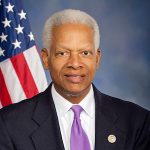
Congressman Hank Johnson (D-GA).
Chair: Hank Johnson (GA-4)
Representative Henry “Hank” Johnson, Jr., was born October 2, 1954. He grew up in Washington, D.C. Johnson graduated from Clark College (now Clark Atlanta University) in 1976 and received his law degree from Texas Southern University’s Thurgood Marshall School of Law in Houston in 1979. Prior to his election to Congress, Representative Johnson served 12 years as a DeKalb County magistrate judge, five years as a county commissioner and three years as chair of the DeKalb County Budget Committee. Johnson also practiced civil and criminal law in DeKalb County for 27 years. Johnson was elected to Congress in November 2006 and sworn in on January 3, 2007. He is currently serving his seventh term in the U.S. House of Representatives from Georgia’s Fourth Congressional District.
During a Committee hearing on patent reform in June 2013, Johnson warned that legislation targeting patent trolls could open the door to deny plaintiffs “their right to go to court in other tort situations.”
Johnson has also been a long-time supporter of the USPTO retaining their fees. During a floor speech in July 2011, Johnson strongly supported the passage of the America Invents Act, although he said he would have preferred stronger language that would have guaranteed the USPTO could keep all of the fees it collected.
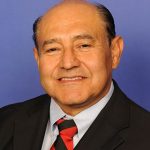 Vice Chair: J. Luis Correa (CA-46)
Vice Chair: J. Luis Correa (CA-46)
Representative Lou Correa was born January 24, 1958, in Anaheim, CA. He completed his undergraduate studies at Cal State Fullerton and obtained both his Juris Doctor and Masters of Business Administration from UCLA. He spent a career as an investment banker, real estate broker and college instructor prior to his first foray into politics in 1996, when he narrowly lost a race for the California State Assembly by less than 100 votes. Correa won a 1998 rematch and served the maximum two terms in the Assembly prior to serving on the Orange County Board of Supervisors and the California State Senate. He began serving in the House of Representatives after the 2016 election when he carried nearly 70 percent of the vote in California’s 46th District.
Correa is a co-chair of the Blue Dog Coalition, a caucus of socially progressive but fiscally responsible Democrats serving in either house of Congress. Despite his position as Vice Chair of the House IP Subcommittee, intellectual property is not listed on his issues page. He has sponsored 28 pieces of legislation during his time in the House including several bills related to cannabis decriminalization, cybersecurity and veterans care.
 Ranking Member: Martha Roby (R-AL-2)
Ranking Member: Martha Roby (R-AL-2)
Martha Kehres Roby was born July 26, 1976, in Montegomery, AL. She completed her undergraduate studies at New York University prior to earning her Juris Doctor in 2001 from Samford University. She worked at the Montgomery-based civil litigation firm Copeland Franco prior to a 2003 election to the Montgomery City Council. Roby has served in the House since 2011, after she defeated former Montgomery Mayor and then-Democratic incumbent Bobby Bright by taking 49% of the vote in Alabama’s 2nd District. During the 2010 elections, Roby and fellow Alabama Representative Terri Sewell (D-AL) became the first two women in Alabama’s history to be voted to Congress during regular elections.
Analysis of Roby’s voting record by ProPublica has shown that she has voted along party lines in 96.7% of her votes in Congress. She has sponsored 24 bills introduced in the House, several of which deal with working families, child protection and veterans issues. While technology or intellectual property don’t seem to be major issues for Roby, she did introduce a bill in October 2016, the Unsecured Server Act, which would have revoked an individual’s security clearance and establish criminal penalties up to 10 years for anyone who knowingly stores classified information on an unsecured server.
Majority Members of the Subcommittee
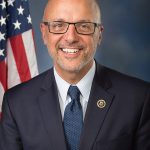 Theodore Deutch (FL-22)
Theodore Deutch (FL-22)
Representative Ted Deutch was born May 7, 1966, in Bethlehem, Pennsylvania. Deutch graduated from the University of Michigan and then from the University of Michigan School of Law. Prior to running for Congress, Deutch worked as a commercial development attorney in Florida, and served in the Florida Senate from 2007-2010. In late 2009, Deutch announced he would be a candidate in the special election to fill the vacated seat of Representative Robert Wexler. On April 13, 2010, Deutch prevailed in the special election and was sworn in as a Member of Congress on April 15, 2010. Deutch he has been highlighted by Roll Call as a young, rising voice in the House Democratic Caucus. The grandson of Jewish immigrants from Belarus, Deutch was also named one of America’s top Jewish politicians to watch by the Forward newspaper.
Deutch has served on the House IP Subcommittee since at least the 113th Congress began in 2013. In May 2013, Deutch introduced the End Anonymous Patents Act, which would require any sales or transfers of patents to be disclosed to the Patent and Trade Office, along with a notice of the real party in interest filing by the purchasing entity. Deutch reintroduced this measure in May 2015 but it appears that this bill has never left committee. In November 2013, Deutch (D-FL) joined Representative Jared Polis (D-CO) and Representative Tom Marino (R-PA) to introduce bipartisan legislation to tackle what was then perceived as the growing problem of “patent trolls.” The Demand Letter Transparency Act sought to end vague patent infringement demand letters that often make allegations that the use of common, everyday technology is in violation of a patent holders’ rights. During his tenure in the House, Deutch has sponsored 119 bills introduced into Congress.
 Cedric Richmond (LA-2)
Cedric Richmond (LA-2)
Representative Cedric Richmond was born September 13, 1973, in New Orleans, Louisiana. Richmond is a graduate of Morehouse College, Tulane School of Law and the Harvard University executive program at the John F. Kennedy School of Government. Prior to being elected to Congress, Richmond was elected to the Louisiana House of Representatives in 2000 at the age of 26, making him one of the youngest legislators in the state’s history. In the Louisiana House of Representatives, he served as the Chairman of the House Committee on Judiciary, and he also served on the Ways and Means, House Executive, and Legislative Audit Advisory Committees. Richmond was elected to Congress on November 2, 2010 and is currently the only Louisiana Democrat serving in the House.
Although part of the House Judiciary Committee who approved the Innovation Act in 2015, Richmond became one the many Democrat defectors who voiced concerns with the bill leading to its eventual demise. Along with the House IP Subcommittee, Richmond also currently serves on the Subcommittee on Crime, Terrorism and Homeland Security under the House Judiciary Committee. He is also the Chair of the Subcommittee on Cybersecurity, Infrastructure Protection and Innovation under the House Homeland Security Committee. During his time in the House, Richmond has sponsored 72 bills, many of which deal with postal system reforms, youth and student initiatives and small business issues.
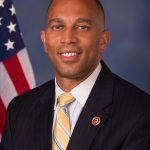 Hakeem Jeffries (NY-8)
Hakeem Jeffries (NY-8)
Representative Hakeem Jeffries was born August 4, 1970, in Brooklyn Hospital and raised in Crown Heights. He is a graduate of Binghamton University, holds a Masters Degree in Public Policy from Georgetown University, and a law degree from New York University School of Law. Following the completion of law school, Hakeem clerked for the Honorable Harold Baer Jr. of the United States District Court for the Southern District of New York. Thereafter he practiced law for several years at Paul, Weiss, Rifkind, Wharton & Garrison LLP, and also at Godosky and Gentile. Prior to his election to the Congress, Jeffries served for six years in the New York State Assembly, winning re-election in 2008 and 2010 with 98% of the vote. He was elected to Congress in November 2012 to replace the retiring Representative Edolphus Towns with over 90% of the vote from his Brooklyn and Queens District. Representative Jeffries serves on the House Judiciary Committee and the House Budget Committee.
Since joining Congress, Jeffries has made a name for himself within the intellectual property world. Jeffries has been a champion of the law school clinical programs that allow law students to represent inventors and small businesses before the USPTO while working under the supervision of attorneys. Jeffries has also introduced alternative patent reform legislation in July 2013, which would have focused only on patent litigation matters. In 2017, Jeffries was part of the bipartisan sponsorship of the Copyright Alternative in Small-Claims Enforcement (CASE) Act, an effort to create an alternative forum for copyright enforcement matters.
Jeffries has a page on his official website dedicated to intellectual property issues, which is noteworthy given that the overwhelming majority of elected officials do not mention intellectual property, or mention it only in passing. Further, his IP page starts: “Strong Intellectual Property (IP) protection is an essential bedrock necessary to spur our economy and further American innovation.” Based on his press releases and speaking engagements, Jeffries has shown great interest in intellectual property. With the Democrats back in control of the House and given that Jeffries comes from an extremely safe district, he can become an increasingly prominent voice on IP issues in the months to come. Jeffries has sponsored 67 bills introduced into the House during his tenure, many of which deal with Congress and law enforcement.
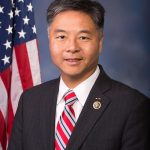 Ted Lieu (CA-33)
Ted Lieu (CA-33)
Ted Lieu was born on March 29, 1969, in Taipei, Taiwan, and immigrated with his family at a young age to Cleveland, OH. He finished undergraduate studies in computer science and political science at Stanford University and earned his Juris Doctor from Georgetown University Law Center, graduating magna cum laude in 1994. After Georgetown, Lieu joined the Air Force, serving four years of active duty and serving in reserve duty since 2000. Lieu joined the California State Assembly in 2005 after winning a special election. He failed to secure the Democratic primary for California’s Attorney General in 2010, losing to now-Senator Kamala Harris. Between 2011 and 2014, he served in the California State Senate before winning election to the House in 2014 to replace the retiring Henry Waxman.
Lieu has an interest in technology matters and he maintains a cybersecurity and technology issues page on his official Congress website. Along with Jeffries, he was an original co-sponsor of the CASE Act. Coverage of last December’s hearing of Google CEO Sundar Pichai by the House Judiciary Committee painted Lieu as overly favorable to Google’s stance on its search engine algorithms. Lieu has sponsored 76 bills introduced into Congress, many of which deal with international affairs, armed forces and law enforcement.
 Greg Stanton (AZ-9)
Greg Stanton (AZ-9)
Gregory John Stanton was born on March 8, 1970, in Phoenix, AZ. After finishing his undergraduate studies in history and political science at Marquette University, Stanton earned his Juris Doctor from the University of Michigan Law School in 1995. He worked as an education attorney from 1995 until 2000 when he was elected to the Phoenix City Council, serving until 2009. Prior to winning the 2018 election to serve in the House representing Arizona’s 9th District, Stanton was the Mayor of Phoenix between 2012 and 2018. Stanton is a member of the pro-innovation New Democrats Coalition and along with his membership on the House IP Subcommittee, he serves on the Aviation and Highways and Transit Subcommittees under the House Committee on Transportation and Infrastructure. Stanton hasn’t sponsored any legislation yet but he has co-sponsored 25 bills during his short time in the House, many of which deal with government operations, immigration and natural resources.
 Zoe Lofgren (CA-19)
Zoe Lofgren (CA-19)
Representative Zoe Lofgren was born December 21, 1947, in San Mateo, California. She is a graduate of Stanford University, with a B.A. in political science (1970), and a holds a law degree from the University of Santa Clara School of Law (1975). Prior to running for Congress, she served as Staff Assistant to her predecessor, Congressman Don Edwards, 1970-1978. Lofgren also practiced immigration law as a partner in the firm of Webber & Lofgren, 1978-1980. She served on the Santa Clara County Board of Supervisors from 1981 to 1994. Lofgren was elected to Congress in 1994 and the 19th District which she represents is sometimes referred to as “the District of Silicon Valley.” She was instrumental in bringing a Satellite Patent Office to San Jose, California. Her biography page says: “Zoe is well regarded for her work on patent reform, copyright issues, digital rights, and net neutrality.” This is an understatement. Lofgren is powerful force on the Democrat side of the isle when it comes to intellectual property, the Internet and legislation relating to technology or more broadly technology companies. While you may sometimes disagree with her positions or politics, you cannot argue her familiarity with the industry and issues facing the industry. Given her long tenure and the district she represents, Lofgren is always an important player in intellectual property reforms.
Lofgren co-introduced the Innovation Act with Goodlatte on February 5, 2015. In 2018, she established herself as a major force for the efficient infringement camp last May when she denounced changes which were then proposed by USPTO Director Andrei Iancu to align the claim construction standard used at the Patent Trial and Appeal Board (PTAB) with the Phillips standard used in federal courts. Lofgren went so far as to send a letter to Director Iancu voicing her concerns despite the fact that she previously supported the Innovation Act which would have brought about exactly the same change in claim construction used at the PTAB. During her tenure in the House, Lofgren has sponsored 258 bills, many of which have dealt with immigration and taxation.
 Steve Cohen (TN-9)
Steve Cohen (TN-9)
Steve Cohen earned his degree from Vanderbilt University, and later a degree from the Memphis School of Law. Prior to being elected to the House of Representatives, Cohen served as Shelby County Commissioner, and also spent 24 years in the Tennessee State Senate. Upon election to Congress in 2006, Cohen quickly earned a reputation as a champion of civil rights and justice, serving on the House Judiciary Committee, with then-Speaker of the House Nancy Pelosi referring to him as the “conscience of the freshman class” in 2008. In 2014, Cohen received perfect voting record recognition from the Leadership Conference on Civil and Human Rights, and he also received perfect voting record recognition on the Food Policy Action’s National Food Policy Scorecard. In 2010 he received the ABA Day Award for his work to promote equal access to justice. A review of his complete biography shows Cohen is deeply involved in many area where the House Judiciary Committee has jurisdiction, but there is no reason to suspect he is particularly interested in matters relating to intellectual property. Cohen has sponsored 254 bills during his tenure in the House, many relating to law enforcement, transportation and finance.
 Karen Bass (CA-37)
Karen Bass (CA-37)
Karen Bass was born October 3, 1953, in Los Angeles, California. She attended San Diego State University, but graduated from California State University in 1990 with a B.S. in health sciences. Thereafter she worked for nearly a decade as a Physician Assistant and served as a clinical instructor at the University of Southern California’s Keck School of Medicine Physician Assistant Program. She was elected to the California State Assembly in 2004, and served as Speaker of the House from 2008 to 2010, the first African American woman to be Speaker in the U.S. She is a member of the House Judiciary Committee and the House Foreign Affairs Committee, as well as a member of the Congressional Black Caucus. She was elected to Congress in November 2012, and sworn in on January 3, 2013. Her website includes an intellectual property issues page, which discusses copyrights and patents as priorities, although the patent section decries “patent trolls” without paying any heed to the major infringement issues that have harmed the U.S. patent system in recent years. This page also describes her support of the Songwriter Equity Act of 2014, although action on this bill has been quiet since March of that year. Bass has sponsored 86 bills during her tenure in the House, many of which relate to international affairs, families and education.
 Eric Swalwell (CA-15)
Eric Swalwell (CA-15)
Eric Michael Swalwell Jr. was born on November 16, 1980, in Sac City, IA, although his family would move to Dublin, CA, during his early years. Swalwell completed his undergraduate studies in government and politics at University of Maryland, College Park, before earning his Juris Doctor in 2006 from the University of Maryland School of Law. While still an undergrad, Swalwell interned at the D.C. office of then-Representative Ellen Tauscher. After law school, he was a deputy district attorney for Alameda County and served on the Dublin Heritage & Cultural Arts Commission and Dublin Planning Commission prior to winning an election to the Dublin City Council in 2010. Swalwell was elected to the House in 2012, unseating incumbent Pete Stark who had represented California’s 15th District and its predecessors since 1973. Swalwell is a member of the High Tech Caucus and the Cybersecurity Caucus and his Congress website maintains a science and technology issues page which touts his sponsorship of the American Research and Competitiveness Act of 2014, which would modernize the research and development tax credit. Along with his membership on the House IP Subcommittee, Swalwell is also the Chair of the Intelligence Modernization and Readiness Subcommittee under the House Permanent Select Committee on Intelligence. He has sponsored 42 bills during his tenure in the House, many of which relate to education, law enforcement and government operations.

![[IPWatchdog Logo]](https://ipwatchdog.com/wp-content/themes/IPWatchdog%20-%202023/assets/images/temp/logo-small@2x.png)

![[Advertisement]](https://ipwatchdog.com/wp-content/uploads/2024/04/Patent-Litigation-Masters-2024-sidebar-early-bird-ends-Apr-21-last-chance-700x500-1.jpg)

![[Advertisement]](https://ipwatchdog.com/wp-content/uploads/2021/12/WEBINAR-336-x-280-px.png)
![[Advertisement]](https://ipwatchdog.com/wp-content/uploads/2021/12/2021-Patent-Practice-on-Demand-recorded-Feb-2021-336-x-280.jpg)
![[Advertisement]](https://ipwatchdog.com/wp-content/uploads/2021/12/Ad-4-The-Invent-Patent-System™.png)







Join the Discussion
No comments yet.